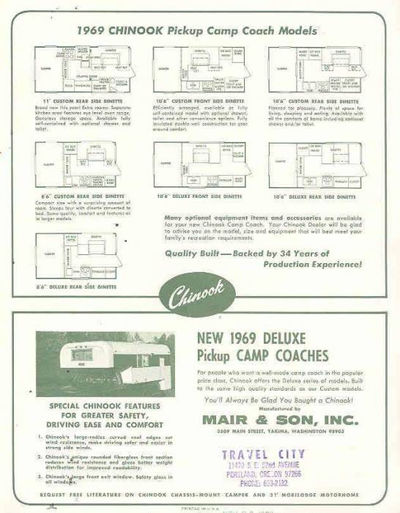Chinooks: Pioneer, Shutdown, Reborn
Chinook. The name can be traced back to 1938 when a family run business began building small travel trailers. The look changed through the years with modifications, body style and chassis.

Tom and Caitlin Morton, the RVers behind the Mortons on the Move website, did a deep dive on the rebirth of Chinooks. You can read about how the name and equipment was purchased by a Las Vegas businessman and brought new luxury models to market.
LINK: Chinook Campers Are Back! The Rebirth of an Icon

The Mortons tell some of the Chinook history in the story starting with the company's debut in 1938.
"In 1938, Mair & Son, Inc debuted as a motorhome manufacturer. In 1966, the Chinook 1400 hit the market. The new fiberglass designs made Chinook one of the most sought-after brands with this new sleek and aerodynamic appearance. The company moved to Union Gap Washington and manufactured all types of RVs, from micro busses to truck campers and fifth wheels. In 1971, the company debuted the first one-piece all-fiberglass shell in the Chinook Mobilodge 2500 and 2500 Brougham.
Over the years, Chinook RV produced motorhomes fit for traveling families. They had motorhomes with convertible living areas for additional sleeping space and motorhomes for adventurous couples with luxuries like stainless steel sinks and private bathrooms. Because the company was located in the western states, it was not as influenced by the mass production techniques of Indiana and retained a unique build style that owners loved.
However, like many RV manufacturers, Chinook RV took a hit during the economic downturn and fuel crisis of the early-2000s."
By 2005 Trail Wagons stopped production at it Yakima, Washington facility. It closed for good in 2006.
Chinook RV's owner Gary Lukehart stored all the manufacturing equipment on his ranch hoping the brand could return when the economy improved. Phil Rizzio was the Las Vegas businessman that bought the equipment and started manufacturing the new breed of Chinook.
Although new Chinook owners are gladly welcome in the clubs, for now most of the members are traveling the country in the classic models from the late 90s to the 2000s.
But these legacy versions are still in demand and every Chinook owner has a story of someone waiting outside a supermarket, restaurant or pub inquiring about buying their beloved "Sportscar of Motorhomes."















